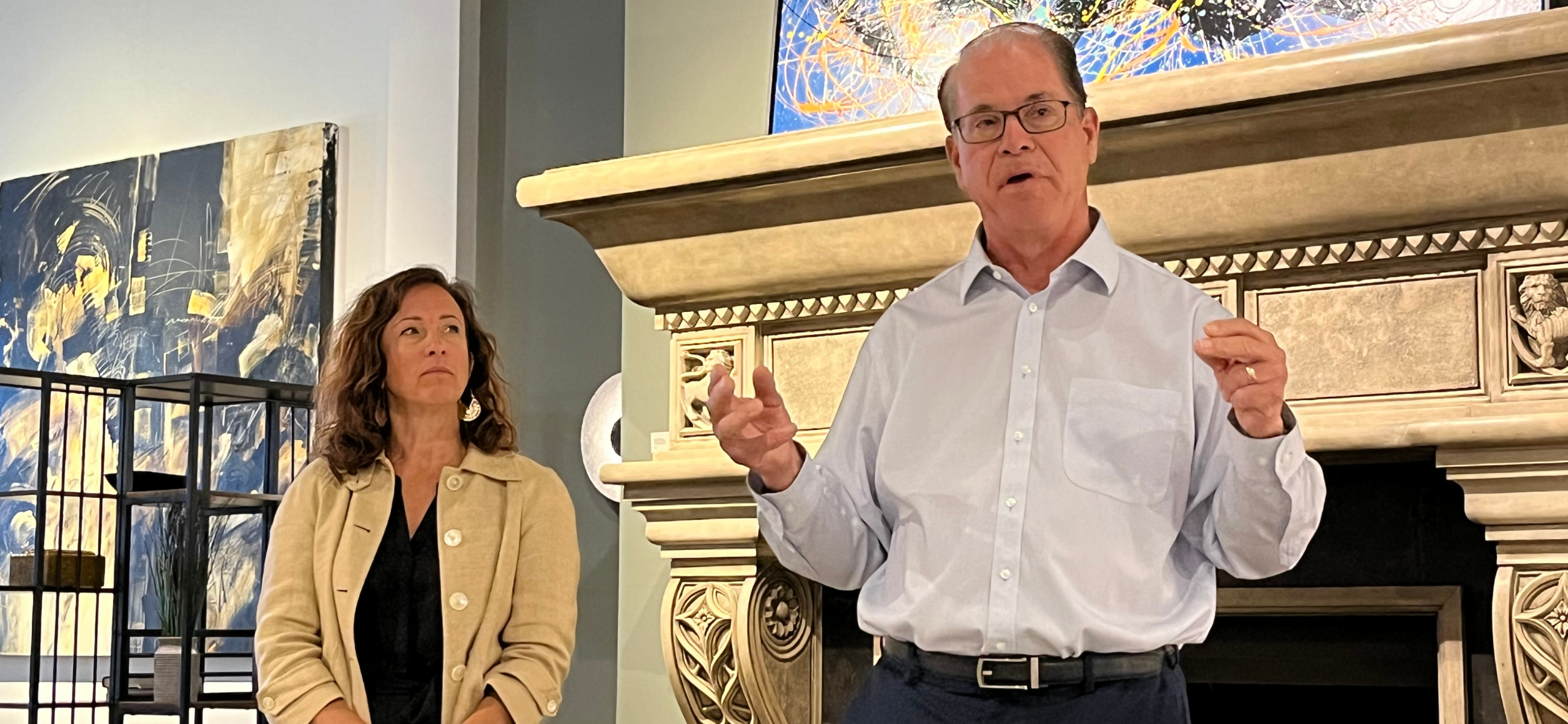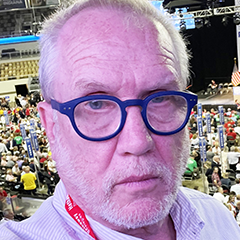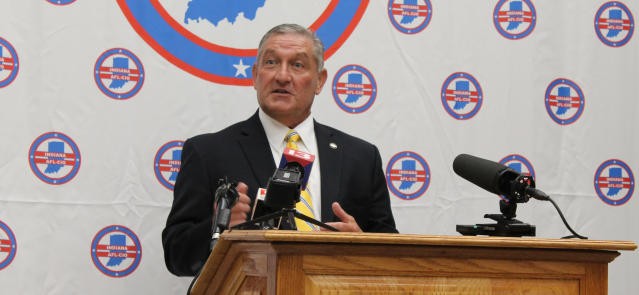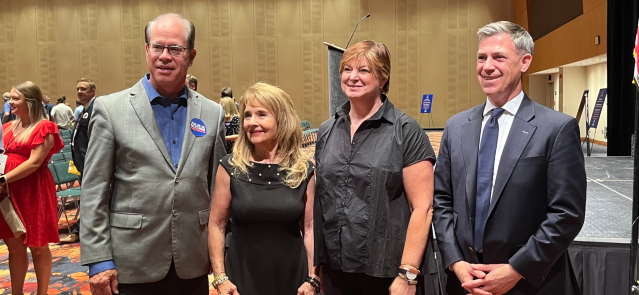Stay ahead of the curve as a political insider with deep policy analysis, daily briefings and policy-shaping tools.
Request a Demo
Republican gubernatorial candidate Mike Braun speaks alongside state Rep. Julie McGuire during a campaign event in Carmel on Tuesday, June 11, 2024. (Credit: Tom Davies)
- GOP convention will choose between lieutenant governor candidates McGuire and Beckwith
- Fallout between governors and lieutenant governors are rare but have repercussions
- Beware of delegate promises and vote counts
By midday this Saturday, 1,800 Republican delegates will make a choice for a lieutenant governor nominee between state Rep. Julie McGuire and Noblesville pastor Micah Beckwith.
While this vote will be a defining one for the political careers of the two candidates, it is gubernatorial nominee Mike Braun who has the most at stake.
The day after securing the nomination with 39% of the vote, Braun tabbed McGuire as his ticket choice. While the Braun campaign has not been overtly critical of Beckwith, sources within the campaign see the pastor as a social “influencer” as opposed to someone with real Statehouse credibility or “legislative chops” — as Braun put it on Tuesday — who could form coalitions and help move an agenda. They say Beckwith has had problems articulating why his candidacy makes sense beyond being a check on Gov. Eric Holcomb.
Braun told State Affairs’ senior Statehouse reporter Tom Davies at a delegate reception in Carmel on Tuesday that he attributed dissatisfaction among delegates to “what happened as we navigated through COVID.”
“This idea that we need to have some watchdog for Mike Braun doesn’t really resonate with most delegates,” one campaign insider said.
In McGuire, the Braun campaign sees “a fresher face, a conservative, a woman” and a working partner. Braun said in Fort Wayne late last month: “The number of people that wanted to be lieutenant governor, none of them were focusing on the most important thing: How do you work with the Legislature? Do you understand the process, and are we going to be synced up on what we need to do?”
What delegates should be thinking about is this future working relationship between a potential governor and lieutenant governor and what happens if there is a falling out between them.
Such discord at the top of the executive pyramid is relatively rare. The only public historic parallels that come to mind are when Lt. Gov. Frank O’Bannon broke a Senate tie on an alcohol-related bill that temporarily unsettled Gov. Evan Bayh; and a simmering breach between Gov. Frank O’Bannon and Lt. Gov. Joe Kernan involving the selection of a state Democratic Party chair in 2002. Kernan was so disgruntled he opted to fold his 2004 gubernatorial campaign in late-2002. Kernan would re-enter the race following Gov. O’Bannon’s death in 2003.
There are two recent examples of GOP delegates rebuking sitting governors.
In 2008, Gov. Mitch Daniels backed Valparaiso Mayor Jon Costas for attorney general, who ended up losing to assistant Attorney General Greg Zoeller by 300 votes. In the June 3, 2008 edition of Howey Politics, we reported: The Daniels hierarchy, retreating to the Columbia Club, was angry and chastened by the defeat, perhaps fearing the wrath of the boss himself at such a loss. Daniels put on a calm, brave face, praising Zoeller. “Greg earned it,” Daniels said. “He got out there early and got a lot of support locked up. It was very positive on both sides. Competition is healthy.”
Asked why he even got involved, Gov. Daniels said, “You’ve heard me say often, including today, that we’ve tried to be inclusive to every part of the state. I’ve worked especially hard on the northwest corner. It’s been too often ignored. I’ve made 60 trips to Lake County alone and created the RDA [Regional Development Authority]. We want to make that part of the state feel fully part of the Indiana family. In [a] contest between two excellent people, I made the argument for a little more geographic balance.”
In 2021, Gov. Holcomb selected state Rep. Holli Sullivan for the vacant secretary of state’s job. While Holcomb’s approval was 73% in a 2022 Morning Consult poll, he was seen as a liability in this race. He didn’t officially endorse Sullivan or campaign with her or for her. A mailer from Diego Morales to delegates described Sullivan as “Holcomb’s puppet” as well as an “elitist.” There had been rampant speculation that delegates would lash out at Holcomb via Sullivan and they did. She was defeated at the 2022 GOP convention by Morales 847 to 561 in what was widely seen as a rebuke to Holcomb’s handling of the COVID-19 pandemic. Morales had accused Gov. Holcomb of “abusing his power.”
Indiana GOP Chairman Kyle Hupfer deflected that sting, saying that Morales had tirelessly worked hundreds of Lincoln dinners over the years and had recently run an unsuccessful 4th Congressional District race.
The difference between those two instances and what Sen. Braun faces this weekend is that the lieutenant governor is, traditionally, much more of a working partner for a governor than attorney general or secretary of state. The governor and lieutenant governor are most often branded together for the campaign. As president of the Senate, the lieutenant governor participates in an administration’s legislative agenda and works to fulfill it during session.
Even in high-functioning executive ticket relationships, there are occasional rifts. There is often tension between their staffs.
If McGuire were to lose to Beckwith, that would be a troubling development for Braun. Perception often becomes reality at the Statehouse, and a loss right out of the chute after the primary would signal weakness.
Braun told delegates in Carmel on Tuesday morning that he is confident McGuire will be nominated. “I think we’re going to do well on Saturday, and we’ll come through it together and not divided, even if it’s a little feisty there, which I don’t think it will be, because almost everything they’re interested in, I’m already doing.”
A delegate told Braun that “the last thing I want is a bunch of infighting between my two executives” in the state.
“I don’t think that will occur, but that will not impact what I intend to do,” Braun said. “I would adapt and live with it. He [Beckwith] doesn’t have the particulars — that most of the folks wanting to be lieutenant governor [also] didn’t have — the legislative chops. I think the delegates understand.”
On gaining full Republican support after getting 40% in the primary, Braun added, “I think when it becomes binary, that quickly gets close to 100%.”
There are three historic instances where there was such a breach in a governor/lieutenant governor relationship that spawned political repercussions.
Crouch falls out with Holcomb
The most recent one just played out in the context of the primary that Braun won. Lt. Gov. Suzanne Crouch finished a distant second place. While her boss, Gov. Holcomb, didn’t endorse a successor nominee, he didn’t help Crouch at all. There were no Holcomb fundraisers for Crouch (who had given the two Holcomb campaigns more than $2 million of her war chest), or ads. For her part, Crouch decided to distance herself from the Holcomb administration on the Lebanon LEAP district and was critical of FSSA after news of a $1 billion cost overrun broke.
While Holcomb’s reelection campaign kickoff at Knightstown in the summer of 2019 featured “Holcomb/Crouch” branding, by the time that campaign was underway in 2020, Crouch was dropped off much of the campaign’s media.
And there were rumblings through much of 2023 that Commerce Sec. Brad Chambers would get into the race, with much of the Holcomb-selected Indiana Republican Party hierarchy joining his campaign, including Chairman Kyle Hupfer, a known close confidant to the governor. Last August at the dedication of the Fall Creek Pavilion at the Indiana State Fair, Crouch wasn’t on the bill despite heading the Department of Agriculture. But there was Chambers, featured prominently during a video presentation. And following her statement critical of the LEAP District in November, Crouch did not participate in Holcomb’s annual legislative and administrative agenda rollout in January.
During the GOP primary campaign that Braun won on May 7, Importantville reported that Holcomb and Crouch had not spoken to each other for nearly a year.
Ellspermann splits with Gov. Pence
In 2015, there were persistent rumors of a falling out between Gov. Mike Pence and Lt. Gov. Sue Ellspermann. During the fall Indiana Republican dinner, Pence failed to mention he and Ellspermann would be on the 2016 ticket together. That created a ripple of speculation that she was on her way out. Pence deputy chief of staff Matt Lloyd was asked about the rumors, and on Oct. 28 he made this statement: “Gov. Pence believes Sue Ellspermann is the best lieutenant governor in the country, is grateful for her service every day and looks forward to serving with her through his second term.”
Then came the mid-December Friday afternoon tipoff to Howey Politics that Pence was actively lobbying Ivy Tech trustees to make Ellspermann president. Other sources had told HPI the Pence administration made a similar appeal late in the process of replacing the Vincennes University president. Lloyd wouldn’t respond to emails and phone calls for three days over that weekend during that December sequence, before finally acknowledging that Ellspermann was seeking the Ivy Tech post.
Prior to Lloyd finally weighing in, HPI contacted Ellspermann spokesman Dennis Rosebrough, who acted stunned by the news, politely begging off the phone call to find out what was going on. Administration sources told HPI that Ellspermann had neglected Pence team advice to make her own staff aware of the Ivy Tech bid.
There had been other reports that Ellspermann had expressed to the campaign discomfort about potential negative advertising against Democratic nominee John Gregg. Pence refused to wage negative assaults on Gregg during the 2012 campaign, and it almost cost him that election. Pence was the only modern governor in Indiana elected with less than 50% of the vote.
Finally, HPI had a chance encounter with Lt. Gov. Ellspermann after the State of the State address in January 2016 as she and her husband awaited a Statehouse elevator. This encounter came after some of our written speculation and there was no “set the record straight” conversation. “She looked sad,” Howey Politics reported.
In the Feb. 11, 2016 edition of Howey Politics covering Ellspermann’s resignation and the selection of Holcomb to replace her on the ticket, we reported: “Ellspermann became suspect to the Pence political wing when she advocated a civil rights [LGBTQ] expansion last September, setting off rumblings heard in this corner of punditry last fall.”
In that February HPI edition, we reported that Pence and Ellspermann’s farewell speeches were perfunctory. “Our current lieutenant governor has done a phenomenal job serving Indiana,” Pence said, calling her “a woman of integrity” and of “extraordinary dedication,” while adding, “From the bottom of my heart, thank you for your service.”
Ellspermann explained she was leaving for the Ivy Tech presidency for a “better seat on the bus.” In a statement after the presser, Ellspermann said, “In each of our lives, not everything lines up in perfect timing. In my case, the unique opportunity to apply for the office of president at Ivy Tech presented itself.”
Asked about reported disagreements with Pence over the civil rights expansion, Ellspermann begged off. “I very much support the governor and his leadership of Indiana. I have very little additional to add.” Pence acknowledged that he and Ellspermann had policy disagreements. “Sure,” Pence said, “but we got together and talked about it. I told Eric, ‘That’s my style.’ ”
The late IndyStar columnist Matt Tully observed: “He [Pence] and Ellspermann hugged uncomfortably, saying nice things about each other but looking like a couple trying to put on a good show for the children as they announced their divorce. Quite honestly, if there isn’t room for Ellspermann on the Pence team, that helps explain why the team has had so many problems. And, please, let’s not kid ourselves. Lieutenant governors don’t seek new jobs, and governors don’t bless such searches, if the relationship is solid.”
In the Feb. 23, 2016 edition of Howey Politics, we observed: “The notion of Indiana’s first female governor on March 2, the day Ellspermann resigns, seems to be a far away thing.” There was a recollection of a quote from the late IUPUI pollster Brian Vargas a generation ago that Indiana voters weren’t ready to elect a female governor. “I still think Vargas was wrong,” HPI observed. “Hoosiers are open to the idea of a female governor. But the political process has yet to prepare, or find a charismatic figure, a Hoosier Nikki Haley, who can actually pull it off.”
So the Pence/Ellspermann fallout was historically fateful. Donald J. Trump selected Pence for his presidential ticket that July prompting him to resign his nomination. Holcomb won a Republican Central Committee caucus vote later that month (by one vote over U.S. Rep. Susan Brooks). Had there been no Ellspermann resignation, she would have been poised to break Indiana’s glass ceiling nine months later.
Kernan bugs out on Gov. O’Bannon
During the summer of 2002, Gov. Frank O’Bannon announced the appointment of Peter Manous as Democratic state chair. Lt. Gov. Kernan was out of town and it soon became clear that the future gubernatorial nominee was not happy, that he felt he should have had a say or been given the chance to make the selection.
In early December 2002, Kernan stunned nearly everyone in the Statehouse when he announced he would terminate his 2004 gubernatorial campaign. Howey Politics reported in its Dec. 12, 2002 edition: The strange case of Joe Kernan took shape on Monday when he told the press and glum supporters that “it’s just time.” A day later, Kernan told another gathering of the press that he feared that in serving as LG and running for governor, he would do neither well. “If you’ve got two full-time jobs, you’re not going to be able to do either well,” he said. “And if I can’t do something well, I’m not going to enjoy it.”
One of the most intriguing aspects of the Kernan withdrawal was how it unfolded. Gov. O’Bannon was out of town and eventually said, “I was both surprised and disappointed when Joe Kernan called me and informed me of his decision not to run for governor in 2004.”
Some had suggested a rift between O’Bannon and Kernan. Both went out of their way to emphasize their mutual affection. “Joe and Maggie have been special friends to Judy and me for more than 15 years and this was a very difficult and a very personal decision that the two of them have reached,” O’Bannon said. First Lady Judy O’Bannon attended Kernan’s press conference. Asked whether he is angry, O’Bannon said, “As a leader, you can’t get mad. You’ve just got to move forward as strong as you can. . . . I would never get mad at Joe Kernan.”
Gov. O’Bannon would die in September 2003. Chairman Manous would resign after being indicted for corruption that same month. He was later convicted and served 22 months in prison. Former Democratic chairman Joe Andrew and state Sen. Vi Simpson would suspend their Democratic gubernatorial campaigns, and Kernan decided to re-enter the race that November. He ended up losing to Mitch Daniels in November 2004, ending 16 consecutive years of Democratic governors, and putting in motion the current 20-year dynasty that Sen. Braun hopes to extend to a record 24 years in November.
McGuire says Braun ‘needs a partner’
In a Monday interview with Tom Davies of State Affairs, McGuire said that conversations with delegates “have been great. I don’t want to make any predictions, but I feel really good about the way things are headed this weekend.”
She added, “The governor needs a partner who he can work well with, who is aligned with him on his agenda, who knows how to move legislation and who knows how to get things accomplished in state government. He needs a partner he can trust, and so reached out to me and I’m certainly honored and excited to be in this position.”
Beckwith told Davies, “I very much support a good working relationship between the governor and lieutenant governor, but the lieutenant governor is not the secretary of the governor. So people are saying, ‘Well, it might not be bad to have another somewhat independent set of eyes in the executive branch.’ So that message is resonating.”
Asked where he believes he stands with delegates, Beckwith said, “It is different from other convention races because normally the delegates are never given a choice. What’s hard to judge is that, I think, there’s some people out there that really do have to vote for me and are gonna vote for convention, but I think they’re a little hesitant to say one way or the other because they they don’t know what the blowback from the party is going to be.”
Beckwith described himself as a “Todd Rokita-type person,” adding, “I’m not gonna do what the establishment is telling me to do; I’m going to do what’s best for the people and fight for the people.”
As for his chances, Beckwith said, “I think we’re close. It’s gonna be hard to tell going into the convention one way or the other. But I can tell you right now we are feeling very good about our count and I think we’ve got the momentum.”
Conservative leaders back McGuire
In a letter to delegates obtained by Howey Politics, conservative leaders including Jim Bopp Jr., former state chairman Jeff Cardwell and former legislator Scott Schneider made a case for nominating McGuire.
“There is no doubt that Indiana needs a change in direction,” they write. “We agree that Indiana needs a substantial change in direction and, to achieve that, a change in leadership. The COVID lockdowns in Indiana were both unnecessary and destructive and were much more similar to those in deep blue states like Michigan than those in red ones like Texas and Florida.”
These conservative leaders continued, “The Indiana Lt. Governor is not a ceremonial appointment, but an important administrative position with 26 statutory duties: overseeing five administrative agencies, serving on nine councils and commissions, and administering eight programs. But we know little of Pastor Beckwith’s administrative abilities since he prematurely resigned his only public position, as a member of the Hamilton East Public Library Board, in order to run for Lt. Governor, but he still found time to be involved in several advocacy groups.”
Horse Race Status: Leans McGuire.
Brian A. Howey is senior writer and columnist for Howey Politics Indiana/State Affairs. Find Howey on Facebook and X @hwypol.
Statehouse reporter Tom Davies contributed to this story.
Know the most important news affecting Indiana
Get our free weekly newsletter that covers government, policy and politics that impact your everyday life—in 5 minutes or less.
Indiana Economic Development Corp. brings in billions, but workers’ wages remain stagnant
Editor’s note: This article is part of a State Affairs and Fox59/CBS4 series looking at how decisions get made at the Indiana Economic Development Corp. and how it impacts economic development in the state. The IEDC has faced increased scrutiny due to its involvement with Boone County’s LEAP Lebanon Innovation District. Read our first story …
McCormick names Goodin as preferred lieutenant governor pick
Democratic gubernatorial candidate Jennifer McCormick on Thursday named Terry Goodin as her choice for the party’s lieutenant governor nominee. Goodin, a former state representative and House minority leader, is perhaps best known in political circles as a socially conservative Democrat who voted in favor of a 2011 joint resolution saying marriage should be between a …
Scaffolding to soon surround Statehouse dome
The copper dome atop the Indiana Statehouse will soon be encased by scaffolding for a repair-and-cleaning project that’s expected to take more than a year to complete. A large construction crane has been in place outside the Statehouse since March as preparations for the work got underway. But the most visible change will be taking …
Schuler-Hicks could replace GOP Chairwoman Hathaway, sources say
With Indiana Republican Chairwoman Anne Hathaway’s resignation, informed and reliable Republican sources are telling State Affairs/Howey Politics Indiana that Daviess County Republican Chairwoman Janet Schuler-Hicks is under consideration as her replacement. Hathaway told the Indiana Republican Central Committee on Friday that she would step down as the GOP chair, concentrating on her role in charge …




